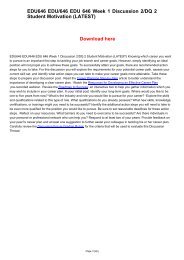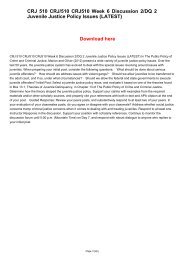COM200 COM200 COM 200 Week 2 Discussion 2DQ 2 Gender and Communication (LATEST)
- TAGS
- gender
- communication
Create successful ePaper yourself
Turn your PDF publications into a flip-book with our unique Google optimized e-Paper software.
<strong><strong>COM</strong><strong>200</strong></strong> <strong>COM</strong>/<strong>200</strong> <strong>COM</strong> <strong>200</strong> <strong>Week</strong> 2 <strong>Discussion</strong> 2/DQ 2<br />
<strong>Gender</strong> <strong>and</strong> <strong>Communication</strong> (<strong>LATEST</strong>)<br />
Download here<br />
<strong><strong>COM</strong><strong>200</strong></strong> <strong>COM</strong>/<strong>200</strong> <strong>COM</strong> <strong>200</strong> <strong>Week</strong> 2 <strong>Discussion</strong> 2/DQ 2 <strong>Gender</strong> <strong>and</strong> <strong>Communication</strong> (<strong>LATEST</strong>) <strong>Gender</strong> <strong>and</strong><br />
<strong>Communication</strong>. 1st Post Due by Day 3. Bevan <strong>and</strong> Sole (2014) present theories that women <strong>and</strong> men communicate<br />
differently based growing up in ?different cultures? or that they are similar based on the ?gender similarities?<br />
hypothesis. For this discussion, you will be required to think through these ideas by relating these arguments to what<br />
you learn in a video you will watch on gender <strong>and</strong> communication <strong>and</strong> your own experience. Prepare: As you prepare to<br />
write this discussion post, take a few moments to do the following: ? Read the writing prompt below in its entirety. Notice<br />
that there are three tasks: o Explain the ?different cultures? <strong>and</strong> the ?gender similarities? hypotheses. o Discuss<br />
whether or not, based on what you have learned in class <strong>and</strong> in your experience, women <strong>and</strong> men are socialized to<br />
speak differently <strong>and</strong> use different types of body language. o Consider the importance of gender in how we use<br />
language <strong>and</strong> how we communicate more generally. ? Watch at least the first 15 minutes of <strong>Gender</strong> & <strong>Communication</strong><br />
Male Female Differences in Language <strong>and</strong> Nonverbal Behavior. ? You have the option of using one of the supplemental<br />
readings, listed below. ? Review the grading rubric <strong>and</strong> remember that 25% of your grade is based on your application<br />
of course material (Content/Subject Knowledge) <strong>and</strong> 25% is based on your ability to demonstrate you are thinking<br />
critically <strong>and</strong> presenting original ideas. Supplemental Reading Options Cameron, D. (<strong>200</strong>7, October 1). Do men <strong>and</strong><br />
women speak the same language? The Guardian. Retrieved from<br />
http://www.theguardian.com/world/<strong>200</strong>7/oct/01/gender.books Rogers, T. (2011, October 16). Why do men <strong>and</strong> women<br />
talk differently? A new book argues that guys argue <strong>and</strong> girls overshare for a reason: Evolution. The author explains.<br />
Retrieved from http://www.salon.com/2011/10/16/why_do_men_<strong>and</strong>_women_talk_differently/ Reflect: Take time to<br />
reflect on the role of language in communication. Consider whether or not women <strong>and</strong> men communicate differently <strong>and</strong><br />
whether language itself is embedded with ideas about gender. Write: Based on what you have learned this week from<br />
our text <strong>and</strong> the video, answer the following questions: ? What are the gender similarities <strong>and</strong> gender differences<br />
hypotheses? ? How does gender influence how we communicate verbally <strong>and</strong> nonverbally? ? In your own experience,<br />
do men <strong>and</strong> women communicate differently? If so, how <strong>and</strong> why? ? Why is it important to think about gender when<br />
thinking about communication? Please spend at least two sentences on each of the questions. Note: While we want you<br />
to think through your own experience, this should not be the primary basis of your response. You should use your<br />
experience to think through what you have learned in class. Think of your experience as potential evidence you can use<br />
to support or refute some claims made in the book or video. Thoroughly address all three elements of this prompt by<br />
writing at least two to three sentences on each element. Use the course readings at least once to help you make your<br />
points. Consider copying <strong>and</strong> pasting these tasks into a word file <strong>and</strong> addressing each of them separately. Your answers<br />
should begin with some points about the importance of underst<strong>and</strong>ing nonverbal communication generally <strong>and</strong> then<br />
provide examples. Your initial response should be <strong>200</strong> to 300 words in length <strong>and</strong> is due by Thursday, Day 3. Respond<br />
to Peers: Review your classmates? posts <strong>and</strong> try to find some common ground or exp<strong>and</strong> on the students? ideas. Use<br />
the text to exp<strong>and</strong> on everyone?s underst<strong>and</strong>ing of the importance of nonverbal communication. Ask questions that will<br />
improve everyone?s underst<strong>and</strong>ing of the key functions of nonverbal communication. Respond to at least two of your<br />
classmates? posts by Monday, Day 7. Response posts must be 125 to <strong>200</strong> words in length. If you have questions about<br />
how to participate in discussions, consult ?About <strong>Discussion</strong>s? under the Course Home menu.<br />
Page 1/{nb}

















